[vc_row][vc_column][vc_column_text]Even if you have no idea what the Miranda warning is, you've probably heard some version of it said before in police dramas.
You have the right to remain silent. Anything you say can and will be used against you in a court of law. You have the right to an attorney. If you cannot afford an attorney, one will be provided for you. Do you understand these rights as they have been explained? Having these rights in mind, do you wish to talk?Popular culture makes a bit of a mess of the public's understanding of the Miranda warning. For example, Miranda rights do not have to be read when someone is placed under arrest. Miranda rights need only be administered before an interrogation of a criminal suspect. If a suspect says something incriminating while being arrested, that information is not automatically inadmissible at trial because the Miranda warning was not provided. So just what are Miranda rights, what are the rules regarding the Miranda warning, and why does it exist at all? The Miranda warning arose from a U.S. Supreme Court case decided in 1966. On March 13, 1963, Ernesto Miranda, a 22-year-old with a lengthy arrest record, was brought to the police station for questioning. Police were investigating the kidnapping, rape, and robbery of an 18-year-old woman, and Miranda fit the description of the perpetrator. After two hours of questioning, Miranda confessed to the crime, as well as several other crimes. The police investigators never informed him of his Fifth Amendment rights. At trial, the only evidence provided by the prosecution was a written confession from Miranda. Miranda was convicted and sentenced to 20-30 years. Miranda appealed his sentence to the U.S. Supreme Court. In the landmark case Miranda v. Arizona, the court ruled that Miranda's Fifth Amendment right against self-incrimination and his Sixth Amendment right to attorney representation were violated because he was not adequately notified of his rights by police. Miranda's original conviction was overturned, though he was later convicted at a second trial that did not use his confession as evidence. The Miranda warning arose from the ruling in the Miranda v. Arizona case, as well as the rulings from other similar cases including Gideon v. Wainwright and Escobedo v. Illinois. So what exactly are Miranda rights? Miranda rights are a reminder to individuals facing interrogation while in police custody that they do not have to answer any questions that may be incriminating and are entitled to certain rights under the Constitution of the United States. However, it's important to understand that a violation of Miranda rights will not necessarily lead to the dismissal of a criminal complaint. When facing any questions from law enforcement regarding a possible criminal investigation involving oneself, criminal defense attorneys recommend invoking the right to remain silent and informing the officers that you wish to speak to an attorney. The Law Offices of Scott Warmuth helps defendants navigate the court system to ensure a fair and just outcome to any criminal complaint. For a free consultation, call us today at 888-517-9888.[/vc_column_text][/vc_column][/vc_row]










